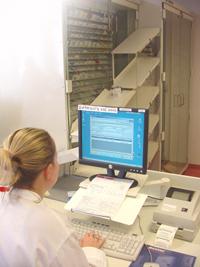|
The Internet has changed the way we live, work and shop. The growth of the Internet has made it possible to compare prices and buy products without ever leaving home. But when it comes to buying medicine online, it is important to be very careful. Some websites sell medicine that may not be safe to use and could put your health at risk. Millions of consumers are using the Internet to get health information. And thousands of web sites are offering health information. Some of those sites are reliable and up-to-date; some are not. How can you tell the good from the bad? Some websites that sell medicine can be not state-licensed pharmacies or aren't pharmacies at all; or may give a diagnosis that is not correct and sell medicine that is not right for you or your condition; or won't protect your personal information. You have to talk with your doctor and have a physical exam before you get any new medicine for the first time. Use only medicine that has been prescribed by your doctor or another trusted professional.
If you take several different medicines, see more than one doctor, or have certain health conditions, you and your doctors need to be aware of all the medicines you take. Doing so will help you to avoid potential problems such as drug interactions. Early in a drug's development, companies conduct research to detect or predict potential interactions between drugs. Experts evaluate the drug-interaction studies as part of assessing a drug's safety. Mixing two drugs together could make one of the drugs ineffective. The combination also could increase a drug's effect, and be harmful. The result might be mild symptoms such as nausea, stomach upset, or headache, or more serious symptoms such as a dramatic drop in blood pressure, irregular heart beat, or damage to the liver-the primary way that drugs pass through the human body. When a drug is taken orally, it usually travels from the stomach to the liver, where it can be metabolized-the process of breaking down and removing chemicals from the body. Enzymes are complex proteins that act as catalysts in starting or speeding up chemical reactions. They cause a specific chemical change in other substances without being changed themselves. The most important enzymes in the liver that metabolize drugs are called the cytochrome P450 family of enzymes. These enzymes break down drugs when they pass through the liver or small intestine. A drug may affect these enzymes by inhibiting them, which causes reduced activity of the enzyme and a buildup of the drug in the body. Or drugs may "induce" the enzymes, which causes increased activity of the enzyme and a reduction of the drug in the body. Health professionals also use computer systems with drug-interaction screening software, electronic prescribing, and other technology. Mark Langdorf, M.D., chair of the department of emergency medicine at the University of California, Irvine, says, "In a busy emergency room, you have to quickly find out what a patient is taking and how those drugs could interact with other treatments." Drug interactions with food and beverages, for example, taking quinolone antibiotics such as ciprofloxacin with food and drinks such as colas, coffee, and chocolate that contain caffeine may cause excitability and nervousness. There can be a potentially fatal increase in blood pressure if food containing tyramine is eaten when taking monoamine oxidase inhibitors, drugs that treat mood disorders.

|